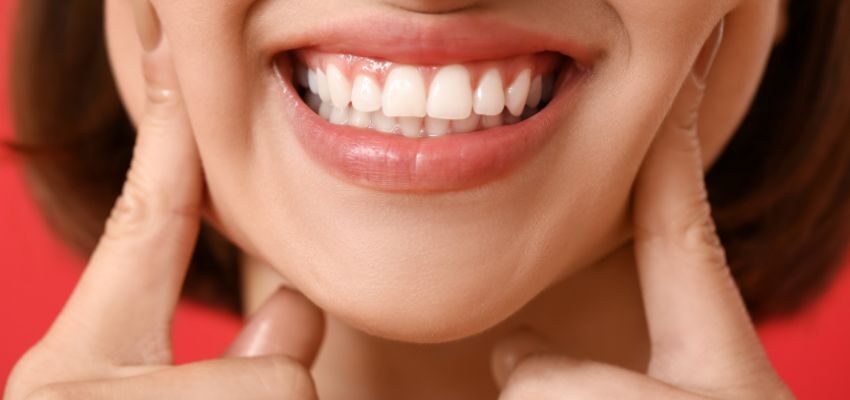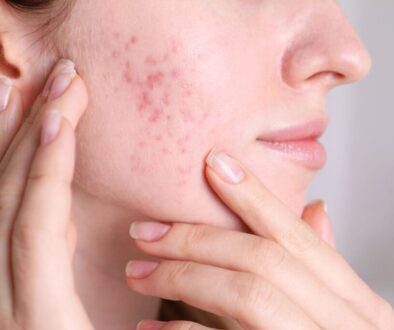Good Oral Bacteria: Probiotics For Optimum Oral Health

Published April 17, 2024
Maintaining a balanced and healthy oral microbiome holds immense significance. Just as the gut benefits from a rich array of beneficial bacteria, so too does the mouth. The right balance of bacteria in the oral cavity can prevent various dental diseases, improve oral health, and even positively impact systemic health.
In this article, we’ll examine the benefits of good oral bacteria for oral health. We’ll learn about the vital probiotic species essential for maintaining this balance and practical tips for enhancing the presence of these beneficial microbes in your oral environment.
Why Does The Oral Cavity Contain Bacteria?
The oral cavity is home to more than 700 species of bacteria, hosting a diverse ecosystem of microorganisms. The rich biodiversity is due to the mouth’s optimal living conditions. It offers direct exposure to the external environment with ideal oxygen and moisture levels.
Food particles on teeth, gums, tongue, and other areas provide a continuous supply of nutrients to the mouth. Saliva plays a crucial role as a defense mechanism, regulating the bacterial population to ensure only certain types can flourish. Beneficial bacteria have adapted to the oral environment, contributing positively to health under normal circumstances.
Disruption in the oral microbiome’s balance introduces harmful bacteria, leading to their proliferation and colonization. This imbalance can result in dental issues such as caries or gingivitis.

What Are The Benefits Of Good Bacteria For Oral Health?
Good oral bacteria are pivotal in enhancing oral health by fostering a balanced oral microbiome and warding off various oral diseases. Below is an outline of the key ways these beneficial bacteria bolster the health of your mouth:
- Combat Pathogenic Bacteria. Good bacteria vie with harmful strains for both space and nutrients within the oral cavity. They mitigate the risk of infections and illnesses such as gingivitis, periodontitis, and tooth decay.
- Reduce Inflammation. Through immune response modulation, they can lessen gum inflammation, which may reduce the severity of periodontal diseases.
- Prevent Bad Breath. Some strains combat halitosis (bad breath) by neutralizing the foul-smelling compounds other bacteria produce.
- Enhance Immune Function. Good bacteria bolster the oral immune system, which is crucial in combating infections and maintaining oral health.
- Decrease Plaque Formation. Certain strains generate substances that inhibit dental plaque formation, thus diminishing the risk of cavities and gum disease.
- Fighting Oral Candidiasis. Good bacteria have antifungal properties that can help control the growth of Candida species in the mouth. They also help prevent or mitigate oral thrush, a common issue in immunocompromised individuals and those wearing dentures.
- Support Saliva Production. They contribute to maintaining a healthy oral microbiome, which in turn supports adequate saliva production. This is vital for neutralizing acids, facilitating digestion, and preventing dry mouth.
Incorporating foods rich in probiotics into your diet or oral probiotic supplements can leverage these benefits, thereby supporting your oral health.

Essential Probiotic Bacteria Species For Optimal Oral Health
Several probiotic bacteria species are renowned for their unique benefits to oral health:
- Streptococcus salivarius K12. This strain excels at suppressing the pathogens that lead to sore throat, dental plaque, and bad breath. Beyond its pathogen-fighting capabilities, Streptococcus salivarius K12 bolsters the immune system and supports the health of the ears, nose, and throat.
- Streptococcus salivarius M18. Notable for producing bacteriocins and enzymes, this strain plays a crucial role in plaque removal and lactic acid metabolism. Its actions are instrumental in preventing tooth decay and combating periodontal disease.
- Limosilactobacillus reuteri. The strain is known for reducing pro-inflammatory responses. It lowers Candida levels and reduces the depth of periodontal pockets, thus promoting healthier gums.
- Ligilactobacillus paracasei. This strain is distinguished by its ability to adhere to and combat oral pathogens responsible for tooth decay. It protects against various oral health issues.

Tips To Improve Probiotic Oral Bacteria
Boosting the population of probiotic bacteria in the mouth is possible in several ways:
- Oral Probiotic Supplements. Taking probiotic supplements crafted for oral health can introduce beneficial bacteria into the oral ecosystem.
- Dietary Adjustments. If you want to know how to increase good bacteria in mouth naturally, start with your diet. Incorporate foods rich in prebiotics, such as leafy greens, garlic, and flaxseed, along with probiotic-rich foods like yogurt, kimchi, and sauerkraut. Doing so can provide necessary nourishment for the flourishing of healthy oral bacteria.
- Effective Oral Hygiene Practices. Consistent brushing, flossing, and non-alcoholic mouthwashes are essential to creating an environment that supports probiotics and minimizes detrimental bacteria.
- Consistent Dental Check-ups. Regular professional cleanings and examinations are crucial for controlling plaque and tartar buildup.
Frequently Asked Questions About Good Oral Bacteria
Can good oral bacteria prevent dental diseases?
A balanced oral microbiome with a healthy level of good bacteria can prevent dental diseases such as tooth decay, gum disease, and halitosis (bad breath). They do this by outcompeting harmful bacteria and maintaining a neutral pH in the mouth.
What happens if the balance of oral bacteria is disturbed?
An imbalance, often resulting from poor oral hygiene, excessive sugar consumption, or antibiotic use, can lead to an overgrowth of harmful bacteria. This can lead to tooth decay, gum disease, bad breath, and other health issues. Due to this, restoring good bacteria in mouth should be a priority.

What bacteria is responsible for causing tooth decay?
Tooth decay occurs due to damage caused by acid-producing bacteria that interact with the tooth’s enamel. The primary culprit behind the formation of cavities is the bacterium Streptococcus mutans. This organism thrives by metabolizing sugars in our diet, creating an acidic environment that erodes the tooth enamel. As oral bacteria multiply, they penetrate deeper into the tooth’s structure, leading to decay.
Are oral probiotics different from gut probiotics?
While both aim to balance their respective microbial communities, an oral probiotic for teeth and gums contain specific strains that are most beneficial for oral health. In contrast, gut probiotics focus on strains that benefit digestive health.

Cultivating A Vibrant Smile With Probiotic Bacteria
Exploring the role of good oral bacteria is a fascinating and promising field. By nurturing a healthy balance of these advantageous microbes in the oral environment, individuals can shield themselves from dental diseases. In the long run, it helps enhance oral health and, consequently, overall well-being. Adopting a comprehensive approach that encompasses dietary modifications, meticulous oral hygiene practices, and the inclusion of probiotic supplements enables anyone to bolster their oral health.
Benefit From The Latest Advancements In Probiotic Science With Bionaze
Bionaze is a proprietary blend of probiotics proven to promote ear, nose, and throat health, improve digestion, and support your immune system. The active ingredients BLIS K12, and BL-04 are considered among the best probiotics according to science.
Get 25% Off Your First Order when you use BIO25 at checkout!

This Content Has Been Reviewed For Factual Accuracy
This content has undergone thorough fact-checking by our team of internal experts. Learn more about the meticulous editorial standard for our website here.
ADVERTISEMENT

About The Author
Hi, I’m Corinne Grace, a proud nursing graduate from Riverside College with a flair for writing. I specialize in health and wellness topics, using my educational background to weave informative and attention-grabbing articles that appeal to a wide variety of readers. Committed to excellence in writing, I’m always refining my skills to stay in sync with the fast-evolving world of digital media. Whether you’re seeking to understand complex health concepts or looking for relatable advice, I’m here to deliver content that’s accurate and enjoyable to read.




